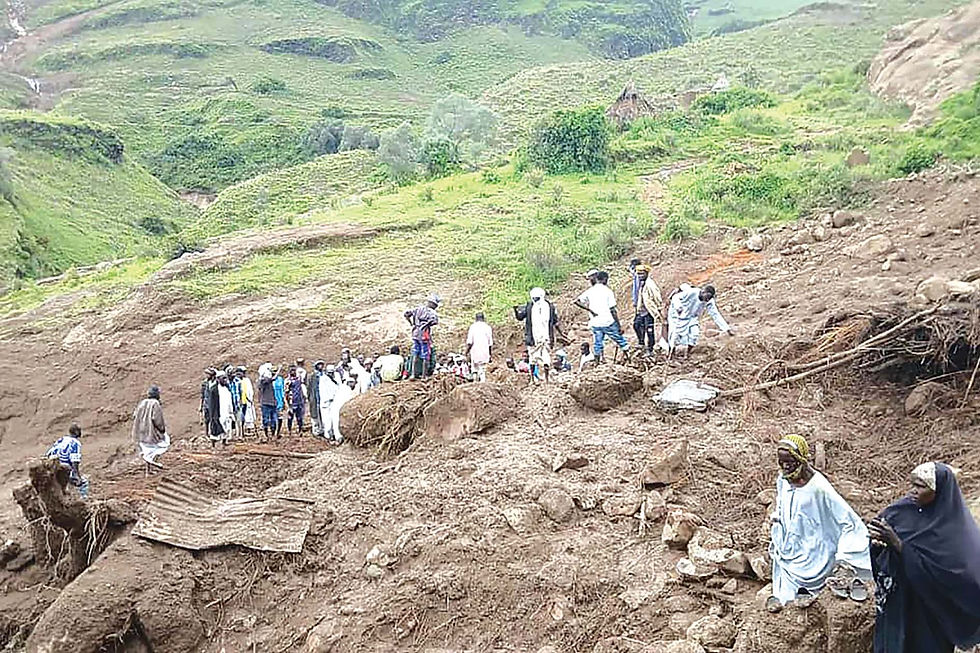Buried Twice Over
- Correspondent
- Sep 6, 2025
- 3 min read
Darfur reels from a landslide even as war, famine and siege push Sudan deeper into one of the world’s worst humanitarian crises in recent decades.

Sudan’s western region of Darfur, long synonymous with man-made catastrophe, is now reeling from one of nature’s deadliest blows. The first day of this month saw a landslide obliterate the village of Tarasin in the Marrah Mountains, killing more than 1,000 people. Rebel commanders of the Sudan Liberation Movement/Army (SLM/A), who control the area, described the settlement as “completely levelled to the ground” and appealed for international help to recover the dead. The government in Khartoum, itself locked in a desperate civil war, promised to mobilise all possible capabilities. In practice, little aid is likely to reach the mountains, more than 900 km west of the capital.
Darfur is no stranger to tragedy. In the early 2000s it became the scene of genocide, as Omar al-Bashir, Sudan’s Islamist strongman, armed the Janjaweed militias to suppress a rebellion. Villages were torched, women systematically raped and non-Arab groups targeted for extermination. The atrocities earned Bashir an indictment at the International Criminal Court. Two decades on, the actors have changed but the dynamics remain grimly familiar. The Janjaweed’s heirs have re-emerged as the Rapid Support Forces (RSF), a powerful paramilitary that turned its guns on Sudan’s army last year. Since April 2023 their conflict has dragged Sudan into one of the world’s worst humanitarian crises.
The siege of El Fasher, Darfur’s last city under army control, has become emblematic of that suffering. For more than 500 days the RSF has cut off the city, bombarding neighbourhoods and starving civilians into submission. Over 600,000 people have fled, while those left behind now subsist on leaves and animal feed. Forty-one health facilities have been destroyed, rape is used systematically as a weapon, and famine has already been declared in parts of the region.
Against this backdrop, Tarasin’s destruction is more than just another natural disaster. It illustrates how conflict magnifies the cruelty of nature. The Marrah Mountains, a volcanic massif rising more than 3,000 metres, have long been a refuge for civilians. Their cooler climate and higher rainfall offered shelter from the desert plains. Yet those very rains triggered the landslide that buried the village. The war has made rescue efforts all but impossible. Even in peacetime, seasonal rains in Sudan have killed hundreds annually, while floods last year collapsed a dam in Red Sea state.
The war itself is reshaping Sudan’s political geography. After losing Khartoum earlier this year, the RSF has sought to entrench itself in Darfur, where it retains ethnic ties and logistical networks. Capturing El Fasher would give it near-total control of the west and allow a rival government to emerge. The SLM/A, fragmented since its heyday two decades ago, has pledged to side with the army against the RSF. Yet such alliances are opportunistic, reflecting Darfur’s role as a battleground not just between Khartoum’s forces but among a kaleidoscope of local militias.
Since independence in 1956 Sudan has lurched from civil war to famine to dictatorship. In the 1980s drought and conflict devastated Darfur, sowing grievances that later fed rebellion. In 1989 Bashir seized power in a coup, promising order but delivering decades of misrule and economic collapse. When he was ousted in 2019, many hoped Sudan might finally escape its cycle of war. Instead, the uneasy power-sharing between the army and RSF unravelled into open conflict. Once again, civilians are paying the price.
While Ukraine and Gaza dominate headlines, Sudan’s war that has already displaced 11 million people - more than any other current conflict - has been largely forgotten. Appeals for aid are met with donor fatigue. Relief convoys are looted or blocked while safe humanitarian corridors remain elusive. Without pressure from regional powers such as Egypt, Saudi Arabia and the UAE, or from outsiders like America, there is little chance of halting the carnage.
Unless Sudan’s war is checked, Darfur will remain doubly cursed: condemned both by history and by nature itself.





Comments